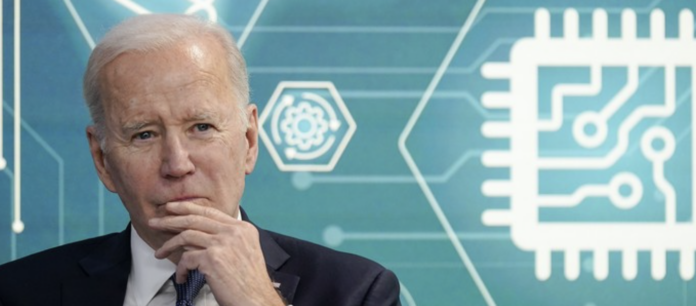Technology has always been a driving force in American politics. From the Fireside Chats of President Roosevelt over radio, to John F. Kennedy’s use of his photogenic appearance in a television debate to win over Richard Nixon and Barack Obama’s use social media in 2008. Artificial intelligence (AI) is a relatively new technology that will play a major role in the 2024 presidential election and present new challenges.
Both sides of the aisle will use AI to reach out to voters and produce newsletters quickly. Experts warn that, while AI technology is set to revolutionize campaigning in the modern age, it can also be used by bad actors to create chaos and further polarize voter.
As a preview to what could become more common as we approach the 2024 election, AI-generated images that are misleading to some viewers already exist. A fake image, created by AI art generator Midjorney 5, showed the former president Donald Trump being chased and arrested by New York Police officers. The creator of these fake images was banned by Midjorney, but not Twitter because his posts stated that he was making pictures.
The Republican National Committee released a video last month in response to Biden’s announcement of his re-election. It featured photo-realistic scenes of panic on Wall Street and China dropping bombs above Taiwan.
AI-generated audio clips titled “Presidential Overwatch Debate” showing Biden and Trump trading insults were circulated in social media platforms this year.
AI is capable of generating misleading content (also known as “deep-fakes”), but another possible impact could be an increase in skepticism toward legacy media sources. It is also possible that politicians could dismiss incriminating information by calling it fake, as they do already.
AI advocates claim that it is a powerful tool to help understand voters. AI can give insights into the motivations and concerns of potential voters. This allows campaigns to better engage them and create policy platforms that reflect their top priorities.
AI is already being used by campaigns to analyze millions upon millions of data points. Martin Kurucz is the CEO of Sterling Data Company. The firm collaborates with Democratic campaign. According to Kurucz’s estimate, a donor profile includes 500 to 1,000 data points. These include their political interests and demographic information.
Kurucz illustrated the enormity of the task when he envisioned a spreadsheet with millions of rows. Each row represented a voter and each row had a thousand data point assigned. Kurucz said, “AI can synthesize this information better than a human.”
Although there are many fears about new technologies, there is also a lot of excitement. Tom Newhouse is the vice president of Converge Media’s digital marketing, a Republican advertising firm. He spoke on AI’s positive effects.
Professionally, I am excited. It’s hard not to be concerned from a personal perspective that the trends of the past decade will continue, putting the burden on the voters to determine what is true and what is false.
AI will have a real impact in the background of campaigning. It will improve fundraising capabilities through better targeting. This could be location targeting, income targeting, hobbies and habits, or providing campaigns with updated voter data.
Joe Rospars of the left-wing political consultancy Blue State said that the impact of AI reflects the values of the people who use it.
AI’s impact will be a reflection of the values of the people who use it. Bad actors in particular have new tools that can supercharge their efforts in promoting hate and suspicion, or falsifying images, sounds, or videos to try to fool the public and press. Media and tech companies, as well as voters, will need to be vigilant in order to combat these efforts.
AI is a technology that has the potential to be misused, but it also has a fast-paced trajectory. The benefits of AI are not to be ignored. Political campaigns will use the ability to create and evaluate content with unprecedented speed and scale in the upcoming election. AI will chart its course through US political history in 2024, just as radio, television, and social media have done before.




